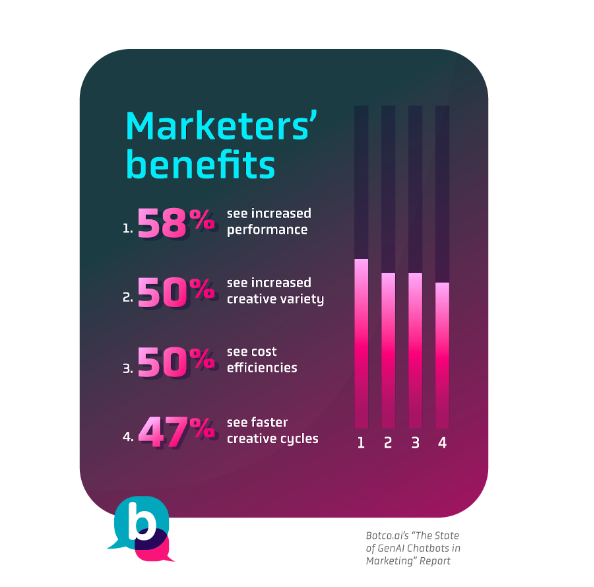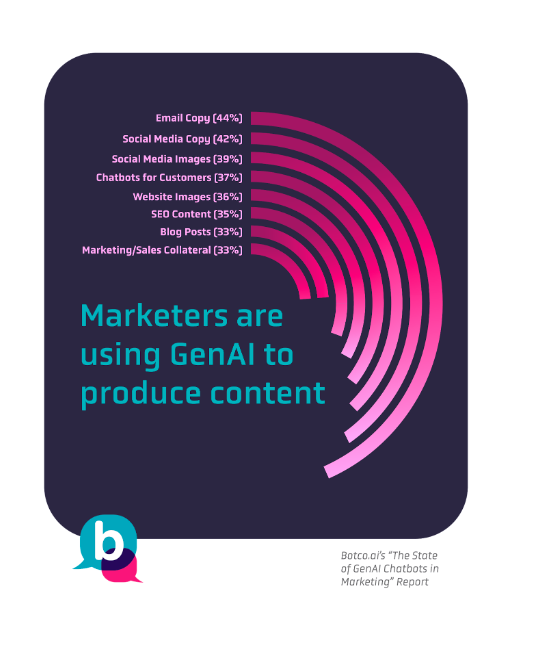Marketers’ Use of Generative AI Is on the Rise
AI-driven content creation is revolutionizing the marketing industry
Generative AI (GenAI), a form of artificial intelligence capable of creating content or designs based on specific input data, has become a game-changer for businesses looking to enhance their marketing strategies, especially in the last six months. From boutique agencies to enterprise marketing suites, businesses of all sizes that adopt GenAI in their workflow are seeing promising results, leading to speedy adoption across industries.
But just how rapidly is GenAI becoming the new norm, and what are the implications for the future? Based on the numbers, it looks like GenAI will be a staple feature of marketing departments within three years, though there are some ethical hurdles that need to be cleared along the way.
Generative AI Adoption and Applications
As technology continues to evolve, the adoption of Generative AI in marketing is growing at an impressive pace. We surveyed 1,000 marketing professionals and found that nearly three-quarters of all marketing departments already use GenAI today. Of those who have yet to implement the technology, 77% expect to do so within the next two years.
Recommended: Weekly AiThority Roundup: Biggest Machine Learning, Robotic And Automation Updates – May 3rd Week
A large chunk (39%) of marketers trust AI for images, but more trust it to churn out written words. Of marketers using GenAI, 44% use it for email copy, 42% use it for social media copy, 38% use it for SEO content, and 32% use it for blog posts. Notably, there’s a split on whether or not AI-generated content should be used as anything other than an outline or draft. Right now, 49% of marketers trust it with final versions of content.
![Marketers' Use of Generative AI Is on the Rise_1]() How Marketers Are Benefitting from Generative AI
How Marketers Are Benefitting from Generative AI
Marketers that turn to GenAI to create content have been reaping rewards. The most readily apparent is the return on investment, as 66% of GenAI adopters have seen a positive ROI from the technology. But the benefits don’t end there.
On top of streamlining the creative process, 58% of marketers that use GenAI see increased performance, and 50% see increased creative variety.
Leveraging GenAI eliminates the need for long brainstorming sessions — time-consuming ordeals that may not surface valuable ideas. That’s a waste of resources that could be better spent elsewhere, and explains how 47% of marketers using GenAI see faster creative cycles.
AI ML Insights: A Guide on How MLCopilot is Using LLMs & Empowering Developers to Straighten ML Processes
By tapping into GenAI, marketers can automate the creation of various types of content, including advertisements, social media posts, and product descriptions, all while maintaining a high level of quality and consistency. This enables them to focus on more strategic aspects of their campaigns, such as analyzing performance data and refining target audiences.
 Furthermore, GenAI can produce highly personalized content, creating new opportunities for marketers to engage their audience in a more meaningful way. With access to customer data such as browsing history, preferences, and demographics, AI-driven algorithms can generate content tailored to individual users, ensuring that marketing messages resonate on a deeper level.
Furthermore, GenAI can produce highly personalized content, creating new opportunities for marketers to engage their audience in a more meaningful way. With access to customer data such as browsing history, preferences, and demographics, AI-driven algorithms can generate content tailored to individual users, ensuring that marketing messages resonate on a deeper level.
Ethical Considerations
Fast, personalized ad creative is a powerful weapon for marketers to wield, but it’s not without its drawbacks.
Ethical concerns have been a major part of the GenAI conversation, and those concerns aren’t easy to address. In an era where coordinated misinformation campaigns have become a major problem around the world, AI has the power to make the issue exponentially worse. AI-generated deep fakes, including both audio and video, may be used as a malicious form of guerrilla anti-marketing, helping bad actors paint competitors in negative lights. Worse, as the technology becomes more advanced, fakes will be more sophisticated, and thus, more difficult to detect.
Misinformation is only part of the problem. GenAI learns from human-created content, and humans are biased. That creates the potential for highly problematic or otherwise uninformed points of view to find their way into AI-generated material. There’s also the issue of AI “hallucinating,” bizarre instances of GenAI fabricating information and presenting it confidently. At least 24% of marketers cite those kinds of situations as concerns they have about incorporating GenAI into their workflows. Our genAI chat cloud enables the creation of fine-tuned LLMs and since they are trained on enterprise data, they eliminate the hallucinations and privacy and security concerns that face enterprise users.
AI ML Projects: Meet Intrinsic Flowstate: A Web-Based Developer Environment to Build Robotic Applications
The Future of Generative AI in Marketing
As GenAI continues to evolve, we can expect to see these issues get ironed out. GenAI tools have exploded onto the market, but it’s still early days. Tools that are less prone to bias and other errors are bound to emerge. As they do, we’ll begin to see further integration into marketing strategies, with even more sophisticated content generation and personalization capabilities. However, it is essential for marketing professionals to strike a balance between leveraging AI-generated content and preserving human creativity, ensuring that ethical considerations and limitations are appropriately addressed.
By staying ahead of the curve and understanding the potential of this technology, marketing professionals can harness the power of AI-driven content creation to achieve their goals and drive success in an ever-evolving digital landscape. Ultimately, the fusion of human creativity and AI-generated content will pave the way for innovative marketing campaigns and strategies that captivate audiences and deliver outstanding results.

 How Marketers Are Benefitting from Generative AI
How Marketers Are Benefitting from Generative AI
Comments are closed.